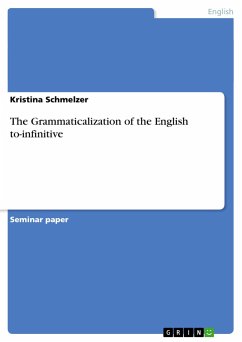Nicht lieferbar

The Grammaticalization of the English to-infinitive
Versandkostenfrei!
Nicht lieferbar
Seminar paper from the year 2012 in the subject English Language and Literature Studies - Linguistics, grade: 1,7, RWTH Aachen University (Anglistische Sprachwissenschaft), course: Grammaticalization, language: English, abstract: Grammaticalization means the transition of a lexical, autonomous form to a grammatical, dependent form. It is a process in which syntactic structures develop out of free discourse structures and that extends over long time periods (cf. Diewald 1997: 11).Hardly any phenomenon of linguistics has raised as many questions as the grammaticalization of the infinitive. The E...
Seminar paper from the year 2012 in the subject English Language and Literature Studies - Linguistics, grade: 1,7, RWTH Aachen University (Anglistische Sprachwissenschaft), course: Grammaticalization, language: English, abstract: Grammaticalization means the transition of a lexical, autonomous form to a grammatical, dependent form. It is a process in which syntactic structures develop out of free discourse structures and that extends over long time periods (cf. Diewald 1997: 11).Hardly any phenomenon of linguistics has raised as many questions as the grammaticalization of the infinitive. The English language differentiates between two infinitive types: The bare infinitive, which is only left in certain constructions, is sometimes described as "a sort of grammatical fossil" (Curme 1931: 456, quoted in Duffley 1992: 12) and the to-infinitive, on the other hand, demonstrates the widely-used form of the infinitive. Haspelmath (1989: 287) gives a glimpse into the prevalent view, that "the [to-] infinitive is the basic and unmarked form of the verb", which "carries no meaning of its own". The influential linguist Roman Jakobson states the definition as follows:Among all verbal forms, it is the infinitive which carries the minimal grammatical infor-mation. It says nothing either about the participants of the narrated event or about the relation of this event to other narrated events and to the speech event. (Jakobson 1957: 142; quoted in Haspelmath 1989: 287)Chomsky (1957:100) hypothesizes even more radically by saying that to is a morpheme that "can hardly be said to have a meaning in any independent sense" at all. However, there are different approaches and opinions about the grammaticalization of the to-infinitive and its status within linguistics.In his article "From purposive to infinitive - a universal path of grammaticization", published in 1989 via Folia Linguistica Historica, Martin Haspelmath questions the traditional definition of the infinitive. Using the German infinitive development as an example, he demonstrates the infinitival evolution ranging from the Old English/Old German periods to the current use of language. He states that the infinitives occurring in most languages actu-ally "do have a meaning and also a form of their own" (Haspelmath 1989: 288), and that the grammaticalization process, which the infinitives underwent, follows a universal path. As a reaction to this, Olga Fischer published her article "The grammaticalisation of infinitival to in English compared with German and Dutch" in 1997. Functioning as an annotation to Haspelmath's theses, she illustrates her view of the infinitival grammaticalization, [...]



